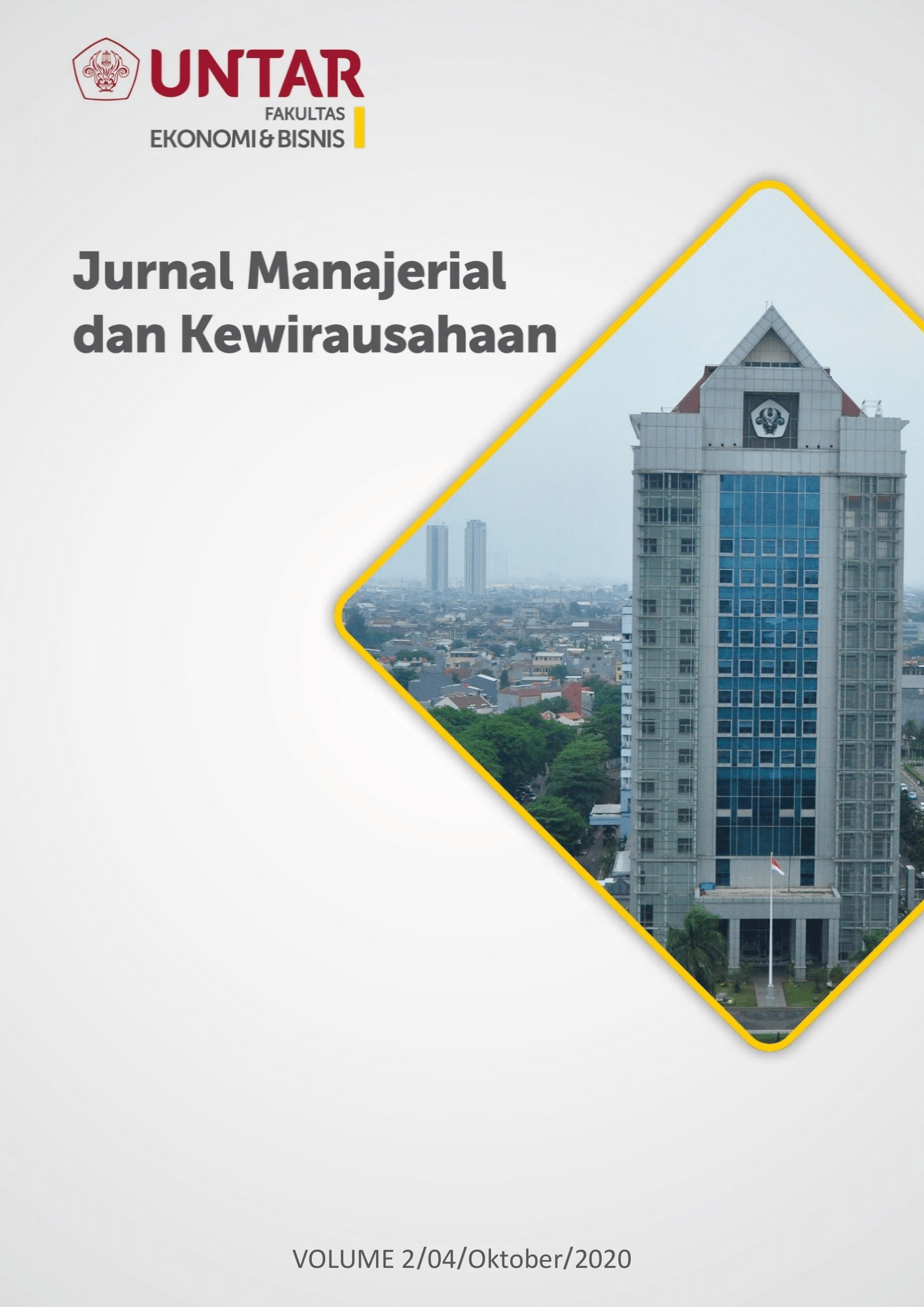Pengaruh Work-Life Policies terhadap Organizational Commitment Dimediasi Oleh Variabel Job Satisfaction pada Karyawan Tetap di Nico Course
Main Article Content
Abstract
The purpose of this research is to analyze the influence of work-life policies towards organizational commitment mediated by job satisfaction variable. The population of this research is the 126 employee from Nico Course. Sample was selected non-probabilty sampling. Data processing techniques using structural equation modeling which assisted by SmartPLS version 3.2.9 program. The result of this study reveals that both work-life policies and job satisfaction have significant and positive effect towards organizational commitment and job satisfaction successfully mediated work-life policies and organizational commitment.
Tujuan dari penelitian ini yaitu untuk mengetahui pengaruh work-life policies terhadap organizational commitment yang dimediasi oleh variabel job satisfaction. Populasi yang diambil dari penelitian ini adalah karyawan Nico Course yang berjumlah 126 orang. Sampel yang dipilih menggunakan non-probabilty samping bersifat purposive sampling berjumlah 100 orang. Teknik pengolahan data menggunakan structural equation modeling yang dibantu dengan program SmartPLS versi 3.2.9. Hasil dari penelitian ini adalah work-life policies dan job satisfaction berpengaruh secara signifikan dan positif terhadap organizational commitment dan job satisfaction berhasil memediasi antara work-life policies dan organizational commitment.
Article Details
This work is licensed under a Jurnal Muara Ilmu Ekonomi dan Bisnis Creative Commons Attribution-ShareAlike 4.0 International License.,/p>
References
Batvandi, Z., & Ghazavi, M. (2017). the Quality of Working Life with Organizational Commitment and Job Satisfaction. 6, 100–110.
Bui, H. T. M., Liu, G., & Footner, S. (2016). Perceptions of HR practices on job motivation and work-life balance: Mixed drives and outcomes in a labor-intensive sector. International Journal of Manpower, 37(6), 1004–1023. https://doi.org/10.1108/IJM12-2015-0214
Chummar, S., Singh, P., & Ezzedeen, S. R. (2019). Exploring the differential impact of work passion on life satisfaction and job performance via the work–family interface. Personnel Review, 48(5), 1100–1119. https://doi.org/10.1108/PR-02-2017-0033
El Badawy, T. A., Chinta, R., & Magdy, M. M. (2018). Does ‘gender’ mediate or moderate the relationship between ‘quality of work life’ and ‘organizational commitment’?: Evidence from SMEs in Egypt. Gender in Management, 33(4), 332–348. https://doi.org/10.1108/GM-04-2017-0050
Gibson, J. L., Ivancevich, J. M., Donnelly, J. H., & Konopaske, R. (2012). Organizations: behavior, structure, processes. New York: McGraw-Hill.
Greenhaus, J., & Powell, G. N. (2016). Making Work and Family Work: From hard choices to smart choices. In Making Work and Family Work: From Hard Choices to Smart Choices. https://doi.org/10.4324/9781315780511
Griffin, R., Phillips, J., & Gully, S. (2016). Organizational Behavior: Managing People and Organizations.
Henry, H., & Desmette, D. (2018). Work-family enrichment and well-being: the role of occupational future time perspective. Career Development International, 23(6–7), 542–556. https://doi.org/10.1108/CDI-02-2018-0043
Jena, L. K., & Pradhan, S. (2018). Workplace spirituality and employee commitment: The role of emotional intelligence and organisational citizenship behaviour in Indian organisations. Journal of Enterprise Information Management, 31(3), 380–404. https://doi.org/10.1108/JEIM-10-2017-0144
Kraak, J. M., Russo, M., & Jiménez, A. (2018). Work-life balance psychological contract perceptions for older workers. Personnel Review, 47(6), 1198–1214. https://doi.org/10.1108/PR-10-2017-0300
Kuruüzüm, A., Çetin, E. I., & Irmak, S. (2009). Path analysis of organizational commitment, job involvement and job satisfaction in Turkish hospitality industry. Tourism Review, 64(1), 4–16. https://doi.org/10.1108/16605370910948821
Martinez-Sanchez, A., Perez-Perez, M., Vela-Jimenez, M. J., & Abella-Garces, S. (2018). Job satisfaction and work–family policies through work-family enrichment. Journal of Managerial Psychology, 33(4–5), 386–402. https://doi.org/10.1108/JMP-10-2017-0376
Mcnall, L., Nicklin, J., & Masuda, A. (2010). A Meta-Analytic Review of the Consequences Associated with Work–Family Enrichment. Journal of Business and Psychology, 25, 381–396. https://doi.org/10.1007/s10869-009-9141-1
Mercurio, Z. (2015). Affective Commitment as a Core Essence of Organizational Commitment: An Integrative Literature Review. Human Resource Development Review, 14. https://doi.org/10.1177/1534484315603612
Mungkasa, O. (2020). Bekerja Jarak Jauh (Telecommuting): Konsep, Penerapan dan Pembelajaran. Bappenas Working Papers, III(1), 1–32. http://workingpapers.bappenas.go.id/index.php/bwp/article/view/52
Novelia, P. (2013). Hubungan Antara Work / Life Balance Dan Komitmen. 2008, 1–19.
Parkes, L., & Langford, P. (2008). Work-Life Balance or Work-Life Alignment? A test of the importance of work-life balance for employee engagement and intention to stay in organisations. Journal of Management & Organization, 14, 267–284. https://doi.org/10.5172/jmo.837.14.3.267
R. Helmle, J., C. Botero, I., & R. Seibold, D. (2014). Factors that influence perceptions of work-life balance in owners of copreneurial firms. Journal of Family Business Management, 4(2), 110–132. https://doi.org/10.1108/JFBM-06-2014-0013
Rene, R. (2018). Pengaruh Work-Life Balance Terhadap Komitmen Organisasi, Kepuasan Kerja , Dan Motivasi Kerja. 16(4).
Ringle, Christian M., Wende, Sven, & Becker, Jan-Michael. (2015). SmartPLS 3. Bönningstedt: SmartPLS. Retrieved from http://www.smartpls.com
Robbins, S. P., & Judge, T. A. (2017). Organizational Behavior, Global Edition. 747.
Sehgal, A. (2014). Book Review: Debra L. Nelson, James Campbell Quick and Preetam Khandelwal, Organizational Behaviour: A South Asian Perspective. Vision, 18(2), 145–146. https://doi.org/10.1177/0972262914528603
Sekaran, U., & Bougie, R. (2016). Research Methods for Business: A Skill Building Approach Seventh Edition. In John WIley & Sons. https://doi.org/10.1007/978-94-007-0753-5_102084
Silva, R., Dutra, J., Veloso, E. F. R., & Trevisan, L. (2020). Leadership and performance of Millennial generation in Brazilian companies. Management Research. https://doi.org/10.1108/MRJIAM-02-2019-0910
Sugiyono. (2016). Metode Penelitian: Kuantitaf, Kualitatif, dan R&D. Bandung: Alfabeta.
Tumewu, F. (2017). a Qualitative Study of Employeesâ Work-Life Balance and Organizational Commitment At Pt Bank Mandiri (Persero) Tbk Manado. Jurnal EMBA: Jurnal Riset Ekonomi, Manajemen, Bisnis Dan Akuntansi, 5(3), 2948–2957. https://doi.org/10.35794/emba.v5i3.17225
X-ers, G. (2017). Study of work-family and family-work conflicts overturns generational stereotypes. Human Resource Management International Digest, 25(7), 42–44. https://doi.org/10.1108/HRMID-08-2017-0143
Yousaf, A., Yang, H., & Sanders, K. (2015). Effects of intrinsic and extrinsic motivation on task and contextual performance of Pakistani professionals. In Journal of Managerial Psychology, Vol. 30, No. 2. https://doi.org/10.1108/JMP-09-2012-0277



